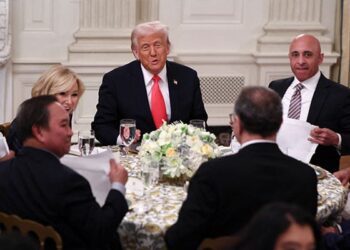- Discussions aim to finalize a ceasefire in the Black Sea as part of a broader peace agreement.
- President Trump ramps up efforts to conclude the long-standing conflict.
- Negotiators addressed key issues perceived as “frustrating” in their diplomatic relationship.
Officials from the United States and Russia convened in Saudi Arabia on Monday to negotiate a maritime ceasefire in the Black Sea, paving the way for a larger truce in Ukraine, as tensions flared with both sides launching drones at each other.
These discussions followed a round of talks held on Sunday between US representatives and Ukraine, after Russia executed its third consecutive overnight airstrike on Kyiv, resulting in one injury and damaging several homes in the surrounding area.
In retaliation, Russia claimed to have intercepted 227 Ukrainian drones in the past day, while firefighters in the Krasnodar region worked to extinguish a fire at an oil depot, a facility impacted by a previous Ukrainian drone strike.
US President Donald Trump has intensified his campaign to resolve the three-year conflict following his conversations last week with both Ukrainian President Volodymyr Zelenskiy and Russian President Vladimir Putin.
According to the White House, the goal of the talks in Saudi Arabia is to establish a maritime ceasefire in the Black Sea to facilitate unhindered shipping. However, military activity in the area has reduced significantly in recent months, casting doubt on whether these discussions will lead to a swift resolution or are merely intended to allow for broader negotiations.
“The main focus here is ensuring safe navigation,” stated Kremlin spokesperson Dmitry Peskov, who noted that a shipping agreement from 2022 had not fulfilled its promises to Russia.
The attention on the Black Sea represents a more focused approach compared to a proposed 30-day ceasefire that the US suggested earlier this month in Saudi Arabia, indicating that Russia may still be far from agreeing to any substantial halt in military actions.
Since 2022, Ukraine has managed to inflict considerable damage on Russia’s Black Sea Fleet, compelling Moscow to relocate some of its ships from their base in Crimea. Despite ongoing Russian assaults on its ports, Ukraine has maintained the ability to export grain, iron ore, and other goods through the Black Sea, particularly from its main ports in Southern Odessa, at levels comparable to pre-war times.
However, Ukraine has been unable to use the Mykolaiv port, once a key export center, and earlier this month, Zelenskiy urged EU leaders to back the idea of a ceasefire both at sea and in the air.
Skepticism in Europe
A source familiar with the planning for the talks indicated that the US delegation is led by Andrew Peek, a senior official at the White House National Security Council, and Michael Anton, a senior State Department representative.
Russia’s side included Grigory Karasin, a former diplomat and current chair of the Foreign Affairs Committee in the Russian parliament, along with Sergei Beseda, an adviser to the director of the Federal Security Service, which is the main successor to the KGB.
Karasin was quoted by the news agency Interfax, mentioning that the discussions were advancing “creatively” and that the teams covered topics viewed as “frustrating” in their bilateral relations during their nearly three-hour meeting.
Trump has consistently called for an end to the war in Ukraine, expressing general approval of the dialogue’s progress and praising Putin’s willingness to engage in the negotiations to date.
Nevertheless, skepticism persists among major European powers regarding whether Putin is ready to consider genuine concessions or if he will continue to insist on what they perceive as uncompromising demands that have remained unchanged since he initiated military action in Ukraine in 2022.
Putin has stated that he is open to peace talks but insists that Ukraine must officially abandon its aspirations for NATO membership and withdraw its forces from regions that four Ukrainian territories claimed by Russia currently occupy.
Temporary Halt on Energy Strikes
The Kremlin confirmed on Monday that Russia continues to uphold a 30-day halt on attacks targeting Ukrainian energy infrastructure, a promise made to Trump last week, despite Kyiv’s ongoing offensive against Russian energy sites.
Ukraine has asserted that it would only support this pause if a formal agreement was signed, accusing Moscow of violating its own cessation, a claim that Russia has denied.
White House National Security Adviser Mike Waltz mentioned on CBS’s “Face the Nation” that the US, Russian, and Ukrainian delegations were all in the same location in Riyadh.
According to Saudi state television, Ukrainian Defense Minister Rustem Umerov has also arrived in Saudi Arabia, suggesting that the US delegation may hold additional talks with Ukraine following their discussions with Russia.
Beyond the ceasefire in the Black Sea, Waltz noted that the teams would also discuss “the line of control” between the two countries, focusing on verification measures, peacekeeping, and stabilizing existing boundaries.
Additionally, he mentioned that “confidence-building measures” are on the agenda, including the return of Ukrainian children taken by Russia.




